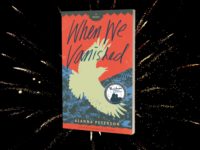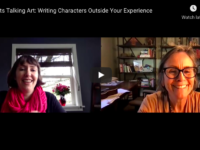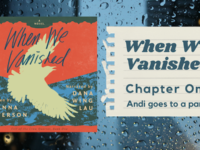My debut novel, When We Vanished, is definitely not all sunshine and roses. Some of the scenes are quite bloody and intense. (I often feel the need to warn people about this, because I probably seem like such a nice girl! Quiet and pleasant, not the type to write a thriller that contains some decidedly twisted moments.)
So, yes, the story does get violent at times. A few of my early readers suggested I should tone this down a bit, and I could definitely see their point. It is a young adult novel, after all, and holding back on the gore might be more appropriate for younger readers.

I reflected on this for a long time, because I believe that writing for young people comes with a lot of responsibility. But, I’ll admit, I also found this feedback kind of surprising. I’ve read some YA recently with violence so hyper-realistic and hard-hitting that it makes even The Hunger Games, which really pushed the envelope when it came out, look tame.
In the end, I didn’t end up toning down WWV all that much, for a simple reason: violence was integral to the story, and so were its painful consequences. I wanted to avoid what I think of as cartoon violence, the kind we see so often in action movies, where everything leads up to the epic battle at the climax, where heroes sustain what would be horrific injuries in real life (that is, unless they manage to miraculously dodge every shot fired at them) but bounce back almost immediately, rarely suffering any long-term effects.
Sure, all of this can be fun to watch. It’s just entertainment, right? And it’s a lot easier to make violent storylines palatable when they’re wrapped up in this comforting narrative.
But I worry that this view of violence can have insidious consequences. It’s one of those things that worms its way into your subconscious, the idea that revenge is noble, that it’s acceptable to inflict pain on others because there won’t be any lasting impacts. Yet, of course, nothing could be further from the truth. Every act of violence ripples outward, leaving wounds that are widespread and often devastating.
At the same time, I didn’t want to be gratuitous about it either. So I tried to make sure that the perpetrator of every violent act had a compelling reason for doing so – and that the consequences of that act were deeply felt, in various ways, by the victims and witnesses. I didn’t just want violence for the sake of violence. As with everything, I only wanted it there because it needed to be there. Because it was part of the story.
The world in which we all live can be incredibly brutal. Reading is one way we can shore ourselves up against the inevitable times when violence, or other tragedies, befall our lives. And, for me at least, writing is how I explore those things for myself. So I didn’t hold back. I tried to “go there.” To get deep inside the minds of these characters as they went through life-changing circumstances. And such experiences come with a cost that can be, at times, unbearably heavy.
I realize that everyone has a different tolerance level when it comes to violence, though, and I totally respect that some people might prefer to avoid it. I’ve added a list of content/trigger warnings to WWV’s page on this website, right under the cover of the book. Clicking the “+” sign will display them. They are a bit spoilery, and may give a somewhat skewed impression of the book, because I promise there’s a lot of levity too! But if there are specific topics you prefer to avoid, by all means check it out.
Your Thoughts
Is violence a turnoff for you in the books you read? If you’re a writer, have you struggled with writing about violent acts and their consequences? I’d love to hear your thoughts in the comments!


